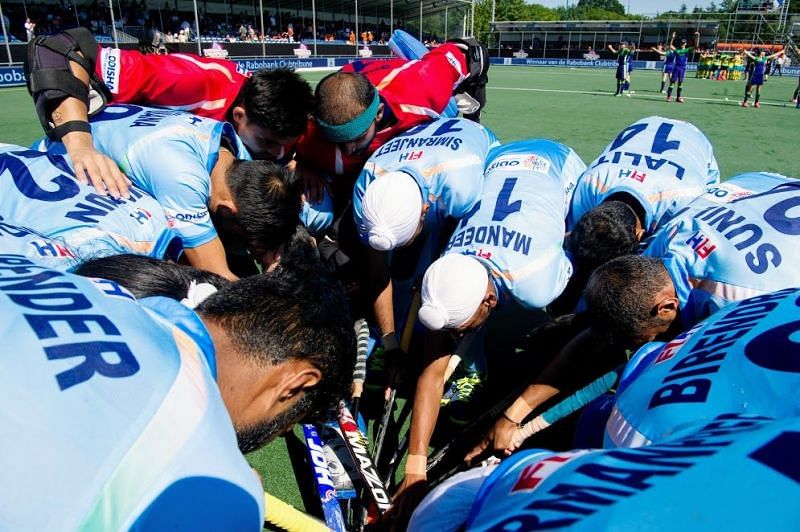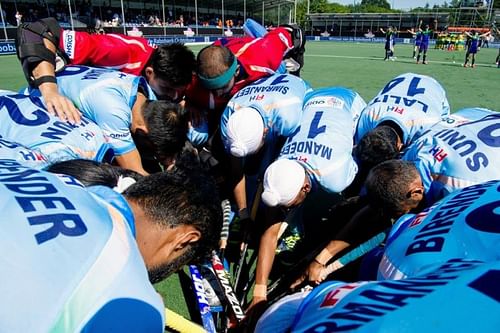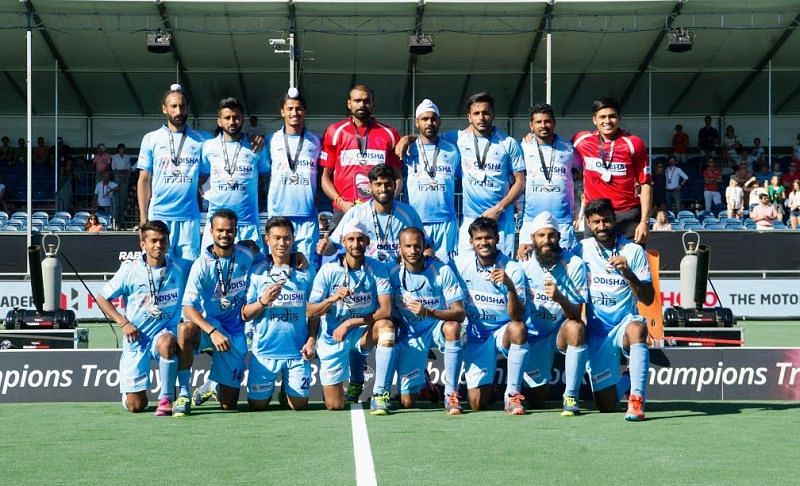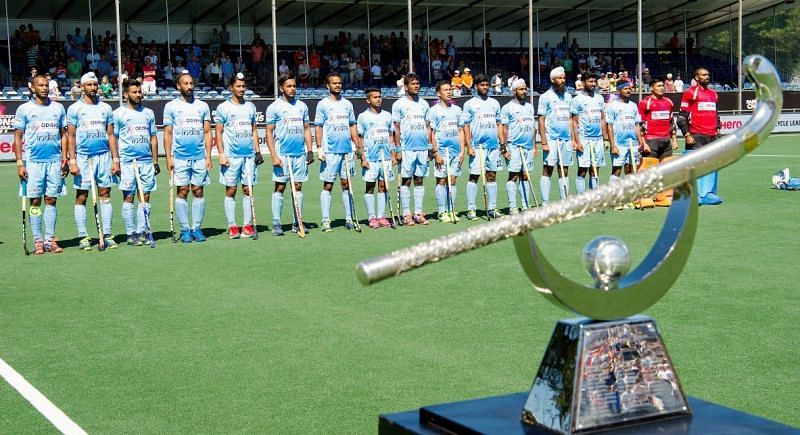
Champions Trophy 2018: 'Silver in CT just the beginning - India will stand atop the podium in the World Cup' says coach Harendra Singh

"India can break into the top 4. I feel we can be No.1 too. If I do not attempt to scale Everest, I will never know what my limitations are, or how far I am capable of going. Considering the potential this team has, I feel we can go much further."
Well, of course, a lot of coaches exude positivity before a big tournament - it is vital for the morale of their team and serves to unsettle the adversary to a degree. Some would even argue that those at the helm have little choice but to issue statements outlining, and often exaggerating the capabilities of their teams.
Harendra keeps his promise
So, when a new appointee, Harendra Singh declared that his players had the potential to punch well above their weight and make inroads into hallowed territory which was hitherto the domain of a chosen few, not many would have given credence to his assertions.
In the absence of the European teams who are not a part of the Commonwealth, India was effectively the second-ranked team at Gold Coast. Yet, they were ridden roughshod over by Wales and managed to just about steal a win at the death, and were forced to split points with a Pakistan team that is now a shade of their more accomplished predecessors.
How indeed could the same team, albeit with a few changes, dare to confront the big four of modern hockey?
As it turned out, the top four seemed well and truly daunted by the marauding Indians and not the other way around! So, does Harendra Singh rate India's performance as one of the best ever?
Sportskeeda had the honour of an interaction with the man who has been associated with Indian hockey for over two decades but refuses to acknowledge his own role in transforming the team's fortunes and cannot hide his disappointment at not finishing with gold at Breda.
"Thank you for congratulating me, but a gold is what we would ideally have wanted," were Harendra Singh's first words as we sought his assistance to analyze India's superlative performance in the Champions Trophy.
"The best is yet to come," says the super coach. "The journey has started, but there is a lot more to achieve."
"In the past too, there have been several notable performances, but when we win a medal the value of the performance seems to be enhanced. Things look pretty rosy now because we won a silver. If we perform well and do not win a medal, nothing seems right in spite of the performance."
"When we started the camp, we told the boys that we must change of the colour of the medal (from silver to gold). I never talk about opponents. I did my homework well and we surprised the opponents with the weapons we had. The aim was to play result-oriented hockey. and that is just what we did."
"On the first day at Breda, the Champions Trophy was on display and Sreejesh and I clicked selfies with the trophy and showed the same to the players during the team meetings."
"We will finish on the podium in the World Cup"

Argentina tasted a shock defeat at the hands of the Indians a day after beating the hosts at Breda. Belgium, the Netherlands, and Australia were, at the very least, shaken by India's sudden revival and will look to invest some extra time in formulating an India strategy ahead of the World Cup.
As for Pakistan, Roelant Oltmans' troops performed creditably keeping in mind their thirteenth ranking, thrashing Argentina and coming pretty close to holding the Aussies and the Belgians too in the classification match. In the opener though, they were outplayed comprehensively by a ruthless Indian side in spite of offering some resistance initially.
"We were in the Champions Trophy to win and not to merely participate," said Harendra.
"There is no doubt that we will finish atop the podium in the World Cup. Hockey India provides us with several amenities and facilities and it is our duty to perform on the pitch. It is also our duty to elevate the status of hockey for the millions of fans who watch us play."
"Mindset needed a change and not technique"
The Indian strikers have traditionally loved playing to the gallery with speedy runs, weaving past a horde of defenders and entering the circle in grand style. The potent combination of speed and artistry served as a delight to spectators the world over but often failed to make a contribution to the scoresheet, especially against the top teams.
At Gold Coast also, the speedy runs were rendered meaningless as two or more defenders often converged en masse to dispossess the strikers in the absence of any support in and around the striking circle. In a discernible change, the Indians held back patiently at Breda by passing the ball around and drawing the opposition players towards them to create manoeuvrable space.
The midfield and the defence held things in place for India in the Champions Trophy. Vital interceptions were made, by them, to foil the advance of the opposition. They also retained possession in their own half to allow their strikers time to regroup before playing the ball into opposition territory.
The defence has never been India's greatest strength - if anything, it an area that has let the team down in crucial matches in the past with the team often conceding soft goals with victory in sight.
As India's Analytical Coach told Sportskeeda ahead of the Champions Trophy, the Indians are naturally extremely fast and skilful but need to focus more on defence. He also emphasized that the strikers needed to help out at the back and that was precisely what we witnessed at Breda.
Indian forwards like SV Sunil were in the thick of the action at Gold Coast looking menacing in the striking circle but at Breda, the men up front retreated whenever required to help out in deep defence. Dilpreet too was equally effective at the back as were the other strikers.
Birendra Lakra was on fire in the final as he gave a dazzling display of magical stick work outside the Australian 25-yard line. Surender Kumar was brilliant in defence but, like Lakra, looked equally dangerous in the Aussie territory.
The Indians were quick to close down the opposition players the moment they made a foray into the Indian half and were quick to reposition themselves whenever a fellow player had advanced. The defence was well organized with some great cover so even if the opposition strikers managed to beat of a couple of Indian players there was always another to make the final interception.
We asked coach Harendra Singh how he managed to execute so many changes at short notice and this is what he told us.
"One coach was changed, but the 48 players were still the same. The style of playing was the same. The ball on the pitch too was just the same and so were the sticks. The mindset of the players needed to be changed as to how they could deny space to the opposition."
"I cannot teach experienced players like Sardar, Birendra Lakra, or Harmanpreet how to defend. I can, however, teach them how to frustrate the strikers of the other side and steal the ball. That was a part of the structure we changed."
"Offence wins matches, but defence wins tournaments"

The man who coached the juniors to victory in the World Cup and the girls to a memorable win in the Asia Cup has a consistent philosophy when it comes to attack and defence.
"I always believe that offence wins matches but defence wins tournaments. Defending is not the work of the defenders alone. Every time we lose the ball, it is the job of all eleven players to try to retain possession."
"In India, we believe wrongly that the areas of play are demarcated strictly between defence and offence. Whenever the ball is with the opposition, it is the duty of each player to try to win back possession with a one-on-one tackle. Every player in the Indian team needs to have the skill to execute one-versus-one tackles just like our troops in the border take on the enemy in one-to-one fights."
Talking of defence, Sreejesh was outstanding and used every part of his goalkeeping paraphernalia including his helmet to block the ball as Croon Jorrit of the Netherlands discovered when he tried to beat the Indian skipper with a scooped shot!.
DId the Indian strikers suffer as a result of injuries?
Akashdeep and Sumit failed to make it to Breda because of last-minute injuries and were replaced by Lalit Upadhyaya and Simranjeet Singh. Ramandeep who was making a comeback after the Azlan Shah tournament suffered an injury and returned to India after the Pakistan encounter. Coach Harendra Singh, however, feels that while their fellow strikers were stretched, they performed admirably.
"We were the only team which played with 17 players (while the others had 18) and the high-intensity matches took their toll on the strikers. There were cards shown too which meant the players on the pitch had to take on a greater workload and in spite of the fatigue, we still played the final."
"The players had the hunger and knew that the nation wanted to see them atop the podium and that was what motivated them."
"It is indeed admirable that we have a team in which any player can replace another in case the need arises."
The year 2016 witnessed a brief but remarkable period of ascendancy for the Indians. Following a good showing in the Champions Trophy, the Azlan Shah Cup, and the Rio Olympics, Indian hockey fans began dreaming big but the reverie was cut short the following year.
This time, one hopes, the resurgent Indians under the tutelage of Harendra Singh will commence and continue their upward climb by qualifying for Tokyo 2020 via the Asian Games and making the most of a World Cup being held at home.